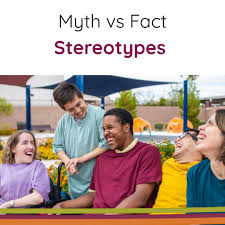written by McKenna Strange
 Stereotypes and assumptions surround our daily lives. They are often subtle, yet powerful, shaping how we perceive others – and how others perceive themselves. A stereotype is a generalization about a specific group of people. Sometimes we assume things without even realizing it—also known as implicit bias. Whether a stereotype is thought of as negative or positive, it can still limit, isolate, and harm.
Stereotypes and assumptions surround our daily lives. They are often subtle, yet powerful, shaping how we perceive others – and how others perceive themselves. A stereotype is a generalization about a specific group of people. Sometimes we assume things without even realizing it—also known as implicit bias. Whether a stereotype is thought of as negative or positive, it can still limit, isolate, and harm.
When discussing disabilities, it’s important to recognize that many harmful stereotypes persist. Media portrayals often reinforce stereotypes and influence how society views individuals with disabilities. Today I want to explore some of the most common stereotypes of individuals with disabilities, in the hopes of raising awareness and encouraging more thoughtful, inclusive interactions.
Disability as “Less Than”
Let’s begin with the word itself: “disability” or “disabled.” The word itself can carry an unintended message that someone is “less than” or “incapable.” The word creates a barrier and mindset that distances one group from another. The truth is, everyone has different needs and abilities — it’s just that the differences are usually more visible between a person with a disability and someone without one.
Media plays an important role in how we view the world – including how we understand disabilities. Some movies or shows might highlight inspiring stories; they can sometimes focus only on dramatic moments of ‘overcoming’ a disability. In the process of this, the hardships that come with having a disability can be overlooked. What’s missing is the day-to-day challenges and reality of living with a disability. As a result, a common stereotype emerges that people with disabilities are “inspirational” simply for existing.
One-Way Lens of the Media
When media is our only source of exposure to disability, these portrayals shape what we assume to be true. Media itself isn’t the enemy — but due to the nature of storytelling in film and television, key pieces of reality are often left out. If this is the only exposure to someone has for a disability it can influence the way people gain knowledge on individuals with disabilities. Media is not bad in this way there is just missing pieces of information due to the nature of tv and movies. This is why it’s important to challenge stereotypes surrounding disabilities.
Another common stereotype is that individuals with disabilities are dependent on others to help because they are not capable. This assumption, while it can be unintentional, can be frustrating when someone assumes capabilities—or incapabilities—without asking first. It takes away independence and autonomy.
There are too many stereotypes to unpack in a single blog post. But there is one truth that applies across all of them: no one fits into one box. Before making a judgment about someone, ask yourself: Do I truly understand their story? Everyone deserves to be heard and understood. How can you listen better to others today to challenge the stereotypes that surround us?










